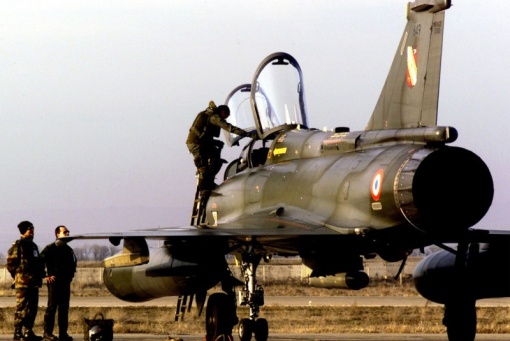The chatter about an imminent Kyrgyz decision to boot U.S. forces out of the Manas airbase has again resurfaced just days before President Kurmanbek Bakiyev sets off on his visit to Moscow. News was first broken Monday by the Vremya Novostei’s Arkady Dubnov (link in Russian), who describes the gesture as an instance of Kyrgyz quid pro quo for $2 billion worth of financial aid from Russia.
That prompted a hasty rebuttal from Kyrgyz deputy and vice chairman of the parliamentary foreign affairs committee, Kabai Karabekov, who insists that no such decision could possibly be taken without the consent of lawmakers. But since the Zhogorku Kenesh has been little more than a craven rubber stamp institution since the dodgy elections of late 2007, getting approval in that chamber should pose few difficulties.
And again Tuesday, Reuters cites an anonymous “source close to President Kurmanbek Bakiyev’s administration” as confirming that plans for the expulsion are apace.
Of course, we have been before – just last month, in fact.
In a very peculiar development in mid-January, the obscure Russian website Svobodnaya Pressa claimed to have been granted an interview by Bakiyev, who is supposed to have let drop that Manas (or Ganci, as it actually called) would indeed be shut down. Kyrgyz news portal Akipress quickly picked up the news, apparently with a confirmation from the (Bishkek) White House that the interview was genuine. In a matter of hours, however, that version was quickly dropped and Akipress reported instead that the president’s spokesman denied the interview ever took place.

A U.S. Air Force pilot preparing to leave Manas?
Clearly, there is no smoke without fire, but there is every reason to believe that Kyrgyz authorities are waging a spectacularly inept information campaign. For whose consumption, we can only speculate. What is certain, however, is that Manas pathetically remains the only bargaining chip that Bishkek has with which to try and extort concessions out of either the U.S. or Russia.
As much as Moscow may want the Americans out _ primarily for motives of pride _ it knows that its $2 billion is going to assure it much more than that. Bakiyev’s crew seems to have decided some time ago that they were pretty much ready to sell off the country’s family jewels to Russia. Notably, Russian gas monopoly Gazprom secured an agreement last October that will eventually see it gain control over Kyrgyz state-owned gas company Kyrgyzgaz. Earlier in the year, Gazprom won exploration rights for two oil and natural gas fields in its penniless prospective fiefdom. It is reasonable that exploitation rights will follow in due course.
The United States, however, have been no slouches when it comes to doling out greenbacks to the Kyrgyz government.
As Col. Christopher Bence, commander of the 376th Air Expeditionary Wing at Manas, helpfully reminded his hosts last month, the base pumps about $80 million annually into the local economy, including lease ($17.4 million), salaries to local workers ($2.64), and goods and services from local companies ($18 million). And that is real on-the-table money, as opposed to the sinister strings-attached rouble cash coming from the Kremlin. Of course, it does mean that the Kyrgyz people have to occasionally put up with being shot at and having tons of fuel dropped on them from time to time. Even so, as genuinely irritated as some sections of the citizenry are becoming with their U.S. guests, it boggles the mind why such a catastrophically cash-starved country would throw away the chance to earn that kind of money.
Even so, the Kyrgyz government is conducting itself with surprising bravado over this and other matters, considering it doesn’t have two pennies to rub together. Almost certainly at the instigation of the presidential administration, parliament announced this week that it plans to consider options for renationalizing the Kumtor gold mining company, jointly owned by Canadian company Centerra Gold Inc. and the Kyrgyz government.
If you subscribe to the generally accepted theory, Kumtor mine was the subject of some hideous corruption back in former President Askar Akayev’s day that ended up with the Kyrgyz coffers being cheated of countless millions of dollars of potential income, so it is not surprise there is some appetite for redistribution. But how Bishkek plans to lay its hands on the hundreds of millions of dollars that buying out Centerra would entail is anybody’s guess.
The answer in Kyrgyzstan is, to coin a phrase, that there is often less than meets the eye. Whatever happens, the Americans should be thinking very hard about a world after Manas, because there is no gain in being played for fools by the crooks in Bakiyev’s administration.
January 14, 2009 at 2:24 am
I’m fairly certain that’s a photo of a French Mirage.
January 14, 2009 at 6:04 am
Hmmm, I do not exclude that possibility as I pretty much plucked it out of a bunch of pictures of planes. But you get the general idea…
January 16, 2009 at 7:53 am
[…] Ekspeditsya reports that the chatter about an imminent Kyrgyz decision to boot U.S. forces out of the Manas airbase has again resurfaced just days before President Kurmanbek Bakiyev sets off on his visit to Moscow. Posted by Adil Nurmakov Print version Share This […]
January 18, 2009 at 4:23 pm
Yeah, my first response was, “Whoa – France is in Kyrgyzstan?” Anyway, this is looking to turn into an interesting tit for tat. I doubt anyone in the US thinks we can outbid Russia in Kyrgyzstan.